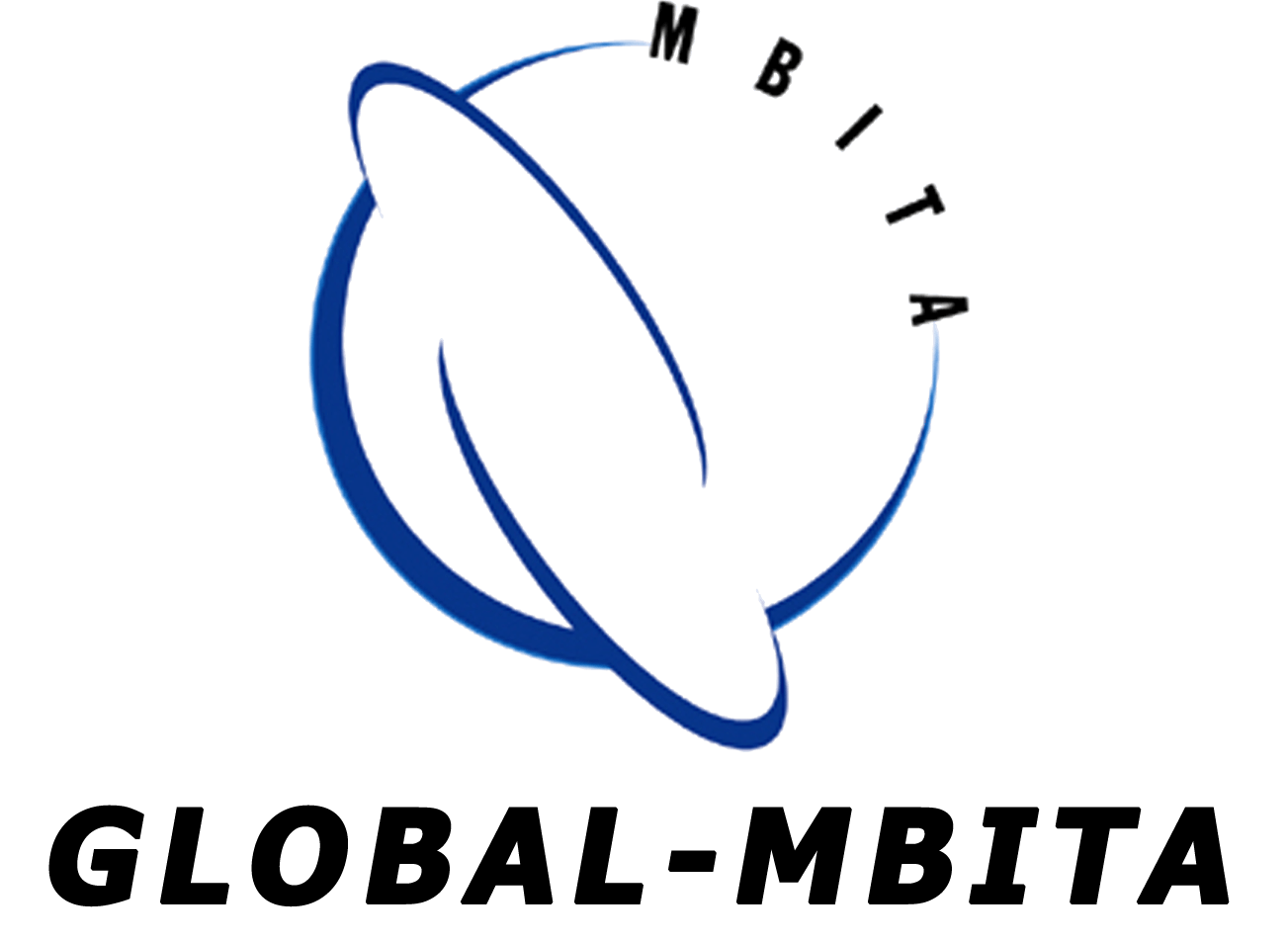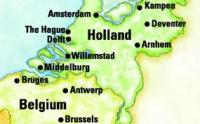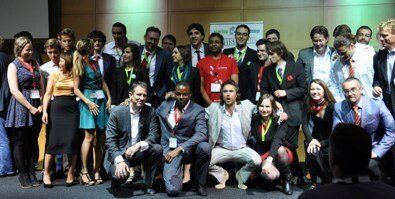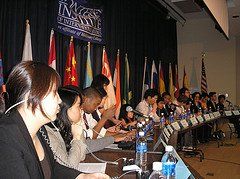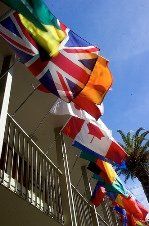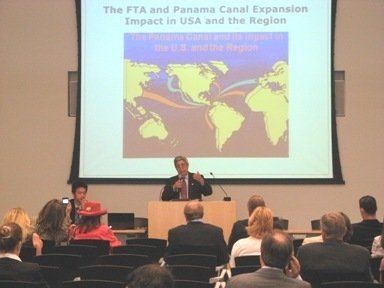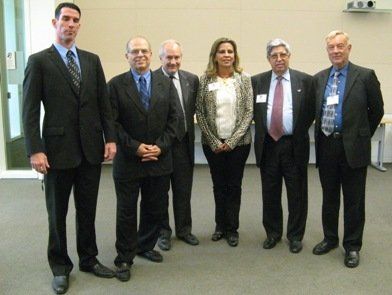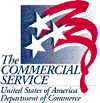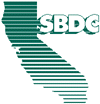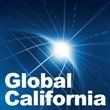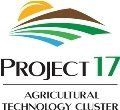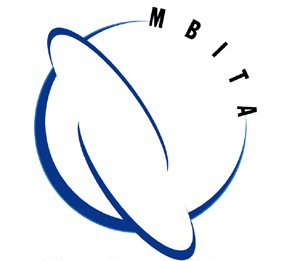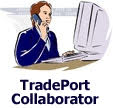UPDATE
As we begin the 2nd half of our business year we have some new, notable MBITA members, a review on our 9th annual Global California Conference on Panama, the beginning of a new initiative between California and Holland, and a new section on trade finance. Enjoy…
President
Tony Livoti
MBITA
Vice President
Shay Adams
AIM Medical Sales
Members
Dr. Edward Valeau
Els Group LLC
Hartnell College
President Emeritus
Marcelo Siero
IdeasSiero
Jim Faith
Jim Faith & Associates
Cristina Polesel
MBITA
General Manager
This newsletter has been created by MBITA's editor
Cristina Polesel
cristina@mbita.org
New Member
MBITA welcomes new member Union Bank
Trade Finance at Union Bank
Union Bank (“UB”) is the second largest commercial bank headquartered in California based on assets at June 30, 2012, serving corporate clients across the country and has a retail customer base of approximately 1 million households, primarily in the major metropolitan areas of the U.S. West Coast. UB is a member of the Mitsubishi UFJ Financial Group (MUFG, NYSE:MTU), one of the world’s largest financial organizations, headquartered in Tokyo, Japan, with operations in more than 40 countries. This combination of financial stability and global reach enables UB to provide a wide range of products and services, including foreign exchange, global treasury management, securities services and trade finance.
UB helps US exporters expand their global sales with financing options such as Letters of Credit and US government loan programs.
Pre-export Vendor Finance
Use a Letter of Credit to help arrange financing for foreign suppliers from local lenders.
Export-Import Bank of the U.S. (Ex-Im Bank) Financing
Helping US exporters grow their export business with UB's proven experience with Ex-Im Bank-guaranteed loan programs: Ex-Im Bank working capital loans provide financing to support export sales of their goods and services by allowing the purchase of materials, equipment, products, services, and labor the exporters need.
Post-export Vendor Finance
Importers can benefit from post-export vendor financing, which can provide attractive U.S. rates to your foreign suppliers.
MBITA visits Amsterdam and their evolved business startup culture
by Tony Livoti, MBITA President
The Startup BootCamp team and the staff of the ten finalists that gave presentations
These Startup BootCamp companies were on a par with any new, hot Silicon Valley start-up showcasing their innovative technologies in mobile marketing, enterprise social media, data management, search technology and a very innovative solution to body imaging and measurement using smart phones and webcams.
I left Amsterdam concluding that there are very strong similarities between the Dutch business culture and that of California. We both share progressive business strategies, a transparent and casual business environment, a strong and efficient business infrastructure and a business acumen that goes back hundreds of years for the Dutch.
MBITA is now working on establishing a program where we can match up Startup BootCamp companies with start-ups in California for strategic alliances that will further spawn growth and innovation. Stay tuned for these exciting developments.
New Member
MBITA welcomes new member SideKarr Inc.
SideKarr is a specialized consulting firm that helps startups and other companies in need of planning, financing and organizational preparation. With many decades of entrepreneurial and operations experience in technology, communications, real estate, sports facility development and other business areas, the company is familiar with the range of organizational challenges and financial constraints that young ventures face.
Any early stage company that is seeking funding is competing today in a very challenging world . . . Great ideas and technologies often are not enough. The business formation, planning and financings also need the benefit of seasoned entrepreneurial skills and proven professional experience. SideKarr's mission is to equip its clients with the advice and components needed to succeed with business formation, financing and growth.
As their name implies, SideKarr rides beside its clients to help them steer through the maze of formation, legal, financial and operations issues that challenge the young company. Within their mission are methods for preserving the founders’ equity and control while providing a fair deal to investors and employees.
The company offers a fully integrated set of cost-effective services that establishes a young company as a well-grounded organization - both from a planning and legal standpoint – fully prepared to raise capital and proceed with technology development and marketing efforts. Their associates and affiliates are all seasoned professionals who share our high standards and enthusiastic commitment to the support of innovation and new business endeavors.
Exciting Changes for MBITA Member
Indeed, the new program name is Trade, Investment and Development, highlighting both the importance of trade to national governments, business, and international organizations, as well as placing trade in the broader context of international flows and their impacts. For more information on degrees, local events such as the recently completed student-run trade conference, and other educational opportunities at MIIS, please contact Program Chair Robert McCleery (rmccleery@miis.edu) or watch their web site
Contact:
Yuwei Shi
Dean and Professor of Strategic Management
Graduate School of International Policy and Management
460 Pierce Street, Monterey, CA 93940
Tel. 831-647-4155
Web: www.miis.edu
Ayse's Corner
Ayse's Corner is a feature column of the World TradeWinds eZine'. Ayse Oge is a published author and global trade marketing expert and author of Emerging Markets.
Singapore: An Economic Powerhouse
by Ayse Oge
Singapore is an island nation the size of Chicago but with twice as many people – it has a population of over 4 million. However, while it’s an island nation, its innovation and economic growth ambition is, in fact, continent-sized. One of the Singapore’s strategic achievements (along with digital media and clean technology) involves being the leader of biotechnology in the global economy. Singapore focuses heavily on nurturing and leveraging human capital in bio-tech areas to establish itself as a dominant power. For example, it recruits world-renowned scientists and arms them with the tools they need to find cures for major diseases. They also plan to educate a generation of native and immigrant Singaporeans to carry on that highly specialized work.
Singapore has had great success in attracting foreign talent; but at the same time, it also provides its local people with the best opportunities for growth to eliminate the brain drain. The country’s brand identity for education – “Thinking Schools, Learning Nation” – rewards high-performing teachers and experiments with new learning technologies. It comes as no surprise that one of Singapore’s most important national icons is its futuristic National Library. Here are some facts about the nation that cause a huge envy from the rest of the world:
- It’s the easiest place in the world to do business.
- It’s the best landing opportunity for dynamic Asian market through its modern port.
- It’s the world’s leader in high-tech exports.
- It ranks highest in the science, technology, engineering and mathematics education among the industrialized countries, including the USA (Source: World Economic Forum Global Competitiveness Report 2011-12).
- Its exports share of GDP is 211%. The U.S. finished last place with 13% in 2010 (Source: World Bank).
Singapore is an important hub for the South-East Asian region. Its economy has always been dependent on international trade. In recent years, the Government has moved to reduce reliance on the manufacture and export of electronics by developing its own service sector, as well as independent biotechnology, chemical and petrochemical industries.
Exports are the main source of revenue for the Singaporean economy. Its primary export partners are Hong Kong, Malaysia, the U.S. and China. Singapore’s major imports include commodities, machinery & equipment, mineral fuels, chemicals and consumer goods.
Singapore’s strong Intellectual Property protection, its American styles of doing business and its predominantly spoken language (English) have made this country a favorable destination for U.S. exporters. Some of the hot markets for exports are health care, energy, aerospace, and educational & training services.
Singapore has truly achieved the economic miracle by investing in human capital – it showcases people with talents, ideas, and knowledge, as well as leaders with entrepreneurial motivation, vision and organizational ability. Singapore is one of the globe’s smallest countries in the world, yet it’s responsible for the largest global footprint in the 21st century.
Ayse Oge is President of Ultimate Trade, International Trade Consulting, Speaking and Training. Her work has been featured by Fox Business Online, Bloomberg Business Week Online and she was quoted by Investor's Business Daily and American Express Open Business Online. She is the author of “Global Business Guide” and a new book, “World Wise Children,” which helps children develop international skills and qualities needed to create future opportunities and realize their dreams. She is Counselor at SCORE, conducting export seminars and webinars for entrepreneurs and small businesses. She can be reached at oge@earthlink.net
MBITA would like to introduce a new ongoing section called, ‘Finance for Trade’. Feature articles from the experts in trade finance will comment and inform us of this very important aspect of a successful global business.
Bank Payment Obligation: An Opinion on a New International Payment Method
by Roberto Bergami
U.S. Exports in April Hit $182.9 Billion
The United States exported $182.9 billion in goods and services in April 2012, according to data released on June 8th by the Bureau of Economic Analysis of the U.S. Commerce Department. Compared to the same time period in 2011, there has been increased activity in Australia ($9.9 billion, +26.3%), the Middle East ($2.1 billion, +23.1%), and China ($3.5 billion, +4.3%). Additionally, fiscal year-to-date authorizations through May 31 for the Export-Import Bank of the United States (Ex-Im Bank) are up from $20.4 billion in 2011 to $21.9 billion in 2012.
“These results demonstrate that U.S. exports remain strong even though there has been economic uncertainty throughout Europe, said Fred P. Hochberg, the chairman and president of Ex-Im Bank. “Exports continue to offer American companies extraordinary opportunities to boost sales to the 95 percent of the world's customers that are located outside the U.S."
Exports of goods and services over the last twelve months totaled $2.145 trillion, which is 35.8 percent above the level of exports in 2009 and a record for the United States. Over the last twelve months, exports have been growing at an annualized rate of 14.0 percent when compared to 2009.
Over the last twelve months, the major export markets with the largest annualized increase in U.S. goods purchases were Panama (37.2 percent), Turkey (33.0 percent), Argentina (29.8 percent), Chile (29.5 percent), Honduras (29.4 percent), Hong Kong (28.9 percent), Peru (27.9 percent), Russia (27.0 percent), Brazil (24.6 percent), and Ecuador (23.0 percent). Of these, Brazil and Turkey are among the nine countries that Ex-Im has identified as having the greatest sales potential for U.S. companies. The other seven countries are Brazil, Colombia, India, Indonesia, Mexico, Nigeria, South Africa, and Vietnam.
This press release was published on June 8th by Ex-Im Bank. For more information about Ex-Im Bank visit www.exim.gov
Press release source article
##########
The National Export Strategy is available also at
http://trade.gov/NEI and http://export.gov.
International Trade Update at
http://www.trade.gov/publications/ita-newsletter/
United States Department of Commerce
Office of Public Affairs - Tel. 202-482-4883
##########
Panama And California Laying A Path For Sustainability
By Richard Andrews, Questpointsolarsolutions
The 9th Annual Global California Panama Conference was held on Friday June 22 in San Jose California. The all day information packed conference was presented by TradePort, the United States Panama Business Council – West (USPAW), the Monterey Bay International Trade Association (MBITA, GlobalCalifornia.com and the City of San Jose.
Robert Krieger, President of Krieger Worldwide and a featured panelist described Panama as the next Hong Kong. The new Free Trade Agreement and the fact that the Panama Canal is set to double its capacity mean a boast for Panama, California and the Americas. Panama is now the largest free trade zone in the Western hemisphere.
Keynote speaker Juan Sosa the Former Ambassador to Panama and current President of United States – Panama Business Council said “the Panama Canal is now operating at 95% capacity. Panama is experiencing double digit growth with only 1% of the population in Latin America. Now as a logistic hub we believe that ports on the west coast, the Gulf and the Atlantic will benefit by our new capacity if they too can upgrade their capacity.”
Port of Oakland’s Ron Brown who also spoke welcomed Panama’s expansion as a sign of growth for California.
The heightened economic activity in Panama is not just about the canal. Panama City the nation’s capital and once dubbed “Panhatten” is a dynamic city. Real estate, banking, ecotourism and renewable energy are key industries poised for growth throughout the nation.
Alvaro Cabal Lachman also a panelist and head of USPAW and CEO of Nearshore Developments provided key insights on real estate in the country today and with Juan Sosa, former Ambassador to Panama rounded out a full day of panelists and presentations including in the future. Participating panelists and sponsors shared valuable insight on doing business in the country. In attendance were representatives of Morgan Stanley, Citibank, Small Business Administration (SBA), FedEx, Panama Pacifico, Colon Free Trade Zone, the Greater San Jose Hispanic Chamber of Commerce, the U.S. Commercial Service, Daryl Ries who spends half the year in New York city and the other half selling homes in Panama to retiring Americans and Daniel Robin, a Senior Partner with In3 Finance Group who has worked on agricultural and renewable energy projects and ventures in Latin America and suggested that PPA’s (Power Purchase Agreements) could provide an affordable solution to bringing solar energy to Panama.
View speaker presentations from the event agenda at http://www.mbita.org/gc2012/agenda.html
Sponsors, Partners, & Affiliates
